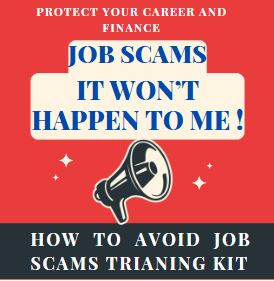“This Won’t Happen to Me” – Why Smart Professionals Still Fall for Job Scams
- Vivian Chang

- Oct 30, 2024
- 2 min read
Updated: Nov 6, 2024

We’ve all thought it: “This won’t happen to me.” With our experience, education, and awareness, it’s easy to believe we’re immune to scams. Yet, every day, smart professionals fall victim. Why? Because scammers count on this exact mindset to catch us off guard.
The Myth of Immunity
It’s a common assumption that only inexperienced or new professionals get scammed. However, even seasoned experts and executives are targeted. Scammers aren’t just sending poorly written emails anymore—they’re evolving and becoming more sophisticated, crafting scams that look and feel professional.
How “This Won’t Happen to Me” Leads to Vulnerability
The belief that “it won’t happen to me” comes from a natural cognitive bias known as optimism bias. It’s the tendency to believe we’re less likely to face negative events compared to others. Scammers exploit this overconfidence by creating credible-looking profiles, personalized messages, and even realistic company websites to appear authentic.
The Evolution of Scams
Gone are the days of obvious red flags. Today’s scams include:
Professional-Looking LinkedIn Profiles: Scammers build profiles with polished photos, job titles, and endorsements to mimic legitimate professionals.
Fake Company Websites: They create convincing websites with job postings and contact details to appear real.
Personalized Messages: Scammers tailor messages using industry-specific language to build trust and lure victims.
Consequences for Professionals
Falling for a scam isn’t just a minor inconvenience—it can lead to stolen identities, compromised personal data, financial losses, or damage to your professional reputation. The stakes are high, and overconfidence can leave even experienced professionals vulnerable.
Simple Steps to Protect Yourself
Verify Job Offers: Research companies and recruiters before engaging. Look for inconsistencies in job postings or profiles.
Check Profile Photos: Be cautious if a profile frequently changes pictures or uses overly polished, stock-like images.
Watch for Urgency: Scammers often pressure you to act quickly. Take your time to verify details.
Use LinkedIn’s Safety Features: Report and block suspicious accounts to protect yourself and others.
Enable Two-Factor Authentication: Add an extra layer of security to your accounts to guard against unauthorized access.
Why Take the “How to Avoid Job Scams” Training Kit?
To stay one step ahead, investing in the “How to Avoid Job Scams” training kit provides:
Up-to-Date Information: Learn the latest tactics scammers use and how to identify them.
Real-World Case Studies: Understand the warning signs and red flags through real examples.
Actionable Steps: Secure your accounts, verify opportunities, and report suspicious activity effectively.
The online leaning kit isn’t just about recognizing scams—it’s about gaining confidence and being prepared without becoming complacent.
Final Thoughts: Don’t Let Overconfidence Be Your Downfall
Scammers are evolving, and no one is immune. The most dangerous mindset is “this won’t happen to me.” Stay vigilant, take precautions, and invest in your security now to protect your career and reputation.
Ready to stay ahead of scammers and secure your career? If you found this article helpful, share it with your network. And if you want to stay ahead of scammers, consider taking online learning course the “How to Avoid Job Scams” training kit today to protect yourself and your professional growth.
Find out the bundle course details here.
Good deals recommended Here (Digital Marketing tools)








Comments